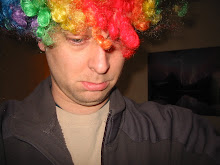So I read this paragraph the other day in Daniel Mackay’s book:
“I see this moment, when the increasing aestheticization of the war gaming narrative finally culminated in the development of the role-playing game performance form, as a reaction to the poverty of the imagination that emptied the architecture of everyday life of any meaning and the scarcity of vision that burdens contemporary philosophy and literature. The imaginative faculty is a built-in function of the human organism - the equivalent to pulses of the heart of the respiration of the lungs. If a people do not find that faculty fulfilled in the world they have been handed, they will build their own.”
My immediate response was something along the lines of “Yeah man… we role-playing gamers are taking back our right to live in a world that inspires us!” I felt pretty good having read that, really validated you know? But then a few hours later I started thinking about it again and began to disagree with some of what he said.
This time of year I can get a little depressed. I’m sure there’s a number of good reasons for it… the usual self-destructive and rampant consumerism in high evidence, the fact that my nearest relatives are 2000 miles away, maybe even just the lack of sunlight. Boo hoo, woe is me. I have to laugh when I think about it because I really have it so well that to be depressed about anything is absurd.
I also have a birthday soon, and there’s something about having turned forty that makes me want to catch myself more quickly when I find myself thinking more cynically and humbugging. When I hear my peers speaking badly of the “younger generation” I’m trying to stop myself from going along with it and really question this type of behavior. Maybe I think I can stop myself from growing old if I can at least remember to remain an advocate for the young. It’s not always easy for a grognard to do. I mean, look at the crazy games kids are playing these days! They call that D&D?!?
But to return to Mackay’s paragraph above, I’m having a problem with his assertion that we live in a time of poverty of the imagination… That “the architecture of everyday life” is “empty of any meaning”… That there’s a “scarcity of vision that burdens contemporary philosophy and literature.” It’s funny to hear this from someone who I assume is younger than myself (his game was 2nd edition). The fact that he lives here in Eugene makes me take his point more personally as well… Is it really that bad? Maybe I should give him a call about it and see how he’s doing. Maybe it’s just that some of us feel a greater need to exercise our imaginations. I can live with that.
Anyhow, if I forget to thank you all for reading or to wish anyone happy holidays, please allow me to do so here and now. In closing, a reminder to myself: Illegitimi non carborundum! Winter solstice is just a couple of days away and things are only going to get brighter. Cheers.
Sunday, December 19, 2010
Subscribe to:
Post Comments (Atom)







6 comments:
my experience writing books is that those of us who write books generally seem way more pissed off about the universe than those who don't.
(possibly because we spend 14 hours a day inside talking to no-one, looking at nothing, listening to nothing trying to write books.)
Gosh Zak.
You should get out more.
Maybe meet a girl or something...
I was thinking about this post today and was trying to formulate a meaningful response, but struggled to do so. At the very least I will say that I like it a great deal and I, too, try to view the world with fresh eyes now that 40 hurtles toward me. :)
@Zak: I have to admit that does make a lot of sense. Maybe it was his thesis and he was just fried at that point too.
@Christian: Thanks man.
“I see this moment, when the increasing aestheticization of the war gaming narrative finally culminated in the development of the role-playing game performance form" - Daniel Mackay
Or
"After burning out playing too many wargames, they went back to their childhood games of make-pretend and systematized them with a bunch of rules" - John Robinson
Post a Comment